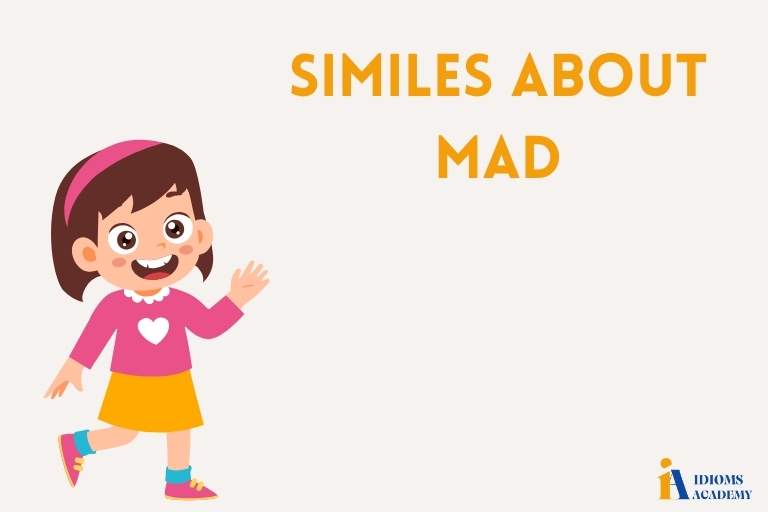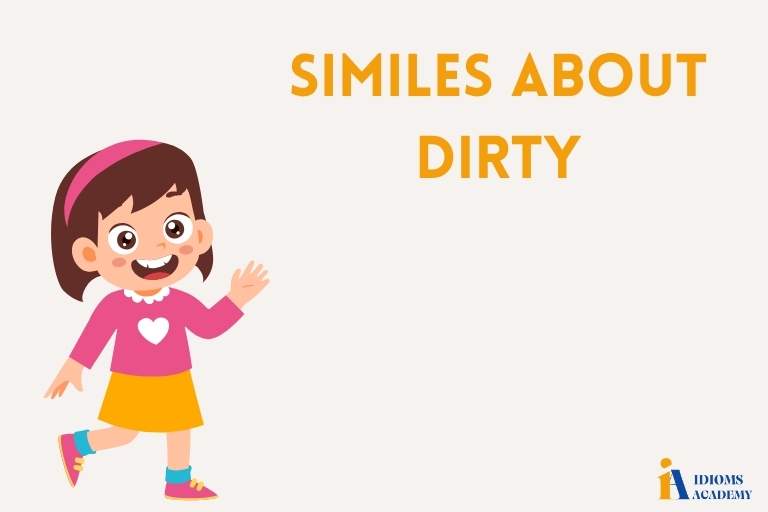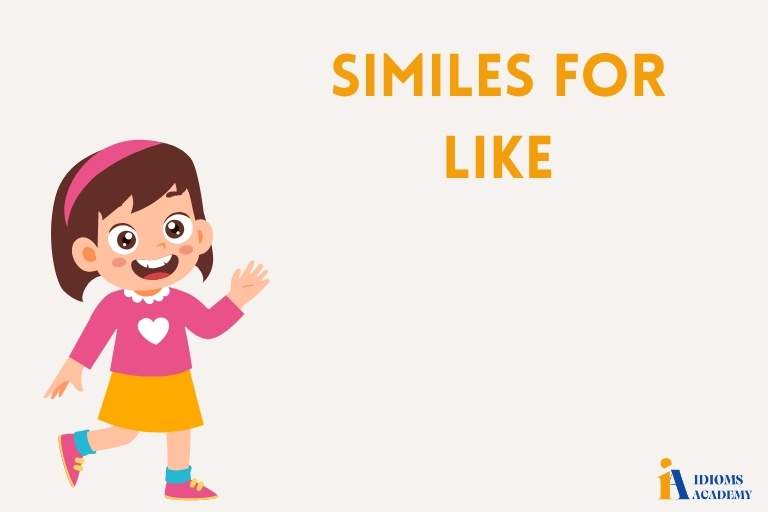Experiences shape how we grow and learn in life. In the United States, kids and adults often describe their feelings using similes. A simile is a way to compare two different things using the words “like” or “as.” This helps make ideas easier to understand. For example, someone might say, “That day was like a roller coaster,” to show they had many ups and downs.
In this article, we will look at similes that explain different kinds of experiences. These similes help us talk about hard times, fun times, and everything in between. Many are used in everyday life across America. You’ll see how these comparisons make stories and feelings come alive in a simple, clear way.
Similes for Experience
1. Like a roller coaster
Meaning: An experience that goes up and down with many emotions
Example Sentence:
• “My first week at the new school was like a roller coaster.”
• “The game was like a roller coaster—exciting one minute, stressful the next.”
Other ways to say: Like a wild ride, full of ups and downs
Fun Fact/Origin: Roller coasters are found in amusement parks across the USA. People often use them to describe emotional changes.
Usage: Used to talk about experiences that have both good and bad moments
2. Like a walk in the park
Meaning: Something easy and pleasant
Example Sentence:
• “Fixing that bike was like a walk in the park for Dad.”
• “The math quiz was like a walk in the park.”
Other ways to say: Piece of cake, super easy
Fun Fact/Origin: Americans often take relaxing walks in local parks, making this phrase feel calm and friendly.
Usage: Used when an experience is simple and not stressful
3. Like chasing the wind
Meaning: Trying to do something impossible
Example Sentence:
• “Trying to find my lost homework felt like chasing the wind.”
• “Getting my little brother to sit still was like chasing the wind.”
Other ways to say: Like trying to catch smoke, pointless effort
Fun Fact/Origin: This simile is popular in the U.S. to describe frustrating tasks that don’t lead anywhere.
Usage: Used when something feels hopeless or hard to control
4. Like walking on air
Meaning: Feeling extremely happy
Example Sentence:
• “She felt like she was walking on air after the spelling bee win.”
• “He was walking on air when he got his puppy.”
Other ways to say: On cloud nine, over the moon
Fun Fact/Origin: Common in American music and movies to show joy.
Usage: Used when someone is feeling very good
5. Like being stuck in quicksand
Meaning: Feeling trapped or unable to move forward
Example Sentence:
• “Trying to fix my computer felt like being stuck in quicksand.”
• “My chores were like quicksand—I couldn’t finish them fast enough.”
Other ways to say: Going nowhere, spinning wheels
Fun Fact/Origin: Quicksand is found in swamps and movies often show people getting trapped in it.
Usage: Used when someone is stuck or overwhelmed
6. Like holding a ticking clock
Meaning: Feeling pressure because time is running out
Example Sentence:
• “The final exam felt like holding a ticking clock.”
• “Getting ready for the school bus was like racing a ticking clock.”
Other ways to say: Like a countdown, racing the clock
Fun Fact/Origin: In many American schools, tests and deadlines are timed, adding pressure.
Usage: Used when time feels limited
7. Like opening a gift
Meaning: A fun surprise or exciting moment
Example Sentence:
• “The field trip was like opening a gift.”
• “Every time Grandma visits, it’s like opening a gift.”
Other ways to say: Full of surprise, unexpected fun
Fun Fact/Origin: Americans often use similes about gifts to show positive feelings.
Usage: Used when something brings joy or surprise
8. Like carrying a backpack full of rocks
Meaning: Feeling a heavy burden or stress
Example Sentence:
• “After the argument, I felt like I was carrying a backpack full of rocks.”
• “Worrying about grades is like carrying a backpack full of rocks.”
Other ways to say: Heavy load, burdened
Fun Fact/Origin: This simile shows how emotions can feel physical. Kids in the U.S. often carry heavy school bags, making it relatable.
Usage: Used when someone is stressed or tired
9. Like flipping a switch
Meaning: A sudden change in feeling or situation
Example Sentence:
• “He got excited like someone flipped a switch.”
• “It was quiet, then loud, like a switch flipped.”
Other ways to say: Changed instantly, like day and night
Fun Fact/Origin: This comes from electric light switches used daily across American homes.
Usage: Used when something happens quickly
10. Like dancing in the rain
Meaning: Enjoying something even during hard times
Example Sentence:
• “Even when we lost the game, we were like dancing in the rain.”
• “Mom said life’s better if you can dance in the rain.”
Other ways to say: Find joy in trouble, smile through storms
Fun Fact/Origin: Inspired by American songs and movies, especially the classic “Singin’ in the Rain.”
Usage: Used when someone stays positive during trouble
11. Like a puzzle with missing pieces
Meaning: A confusing experience that doesn’t make sense
Example Sentence:
• “That story was like a puzzle with missing pieces.”
• “Trying to figure out my feelings was like solving a puzzle with missing pieces.”
Other ways to say: Doesn’t add up, hard to understand
Fun Fact/Origin: Many families in the U.S. do jigsaw puzzles, so this simile feels familiar.
Usage: Used when something is unclear or incomplete
12. Like walking through fog
Meaning: Feeling lost or unsure what’s ahead
Example Sentence:
• “After the test, I felt like I was walking through fog.”
• “Starting a new school can feel like walking through fog.”
Other ways to say: Can’t see clearly, feeling unsure
Fun Fact/Origin: Fog is common in some parts of the U.S., making this easy to imagine.
Usage: Used when things feel confusing or uncertain
13. Like planting a seed
Meaning: Starting something that will grow over time
Example Sentence:
• “Learning a new skill is like planting a seed.”
• “Making friends is like planting a seed—it takes time.”
Other ways to say: Starting small, growing over time
Fun Fact/Origin: Planting is part of life in rural American towns and school gardens.
Usage: Used for the beginning of something that needs time to grow
14. Like reading a new book
Meaning: Starting a new adventure or experience
Example Sentence:
• “Moving to a new town felt like reading a new book.”
• “Every day in fifth grade is like reading a new book.”
Other ways to say: A new journey, full of surprises
Fun Fact/Origin: Many American kids enjoy reading, and schools have reading challenges.
Usage: Used when something is fresh and exciting
15. Like being in a snow globe
Meaning: Feeling like everything around you is moving but you’re stuck
Example Sentence:
• “The big party felt like being in a snow globe—fun but too much.”
• “She felt like she was stuck in a snow globe after the big move.”
Other ways to say: Feeling trapped, surrounded by change
Fun Fact/Origin: Snow globes are a popular decoration and gift in American homes.
Usage: Used when someone feels overwhelmed or still in chaos
16. Like a firework show
Meaning: An exciting, colorful experience
Example Sentence:
• “Winning the contest felt like a firework show.”
• “The parade downtown was like a firework show—amazing and loud.”
Other ways to say: Full of excitement, bursting with fun
Fun Fact/Origin: Fireworks are a big part of U.S. celebrations like the 4th of July.
Usage: Used when something feels amazing and full of action
17. Like climbing a mountain
Meaning: A hard task that takes effort
Example Sentence:
• “Finishing my science project felt like climbing a mountain.”
• “Learning to swim was like climbing a mountain for me.”
Other ways to say: Big challenge, tough job
Fun Fact/Origin: This simile is used across the U.S. to describe long, hard work.
Usage: Used when something is very challenging
18. Like watching paint dry
Meaning: Very boring or slow
Example Sentence:
• “Waiting in line was like watching paint dry.”
• “That movie was like watching paint dry—so slow.”
Other ways to say: Dull, boring
Fun Fact/Origin: This phrase is common in U.S. humor to talk about boring things.
Usage: Used when an experience is slow or unexciting
19. Like baking a cake
Meaning: Doing something step-by-step to get a good result
Example Sentence:
• “Planning the school play was like baking a cake—each step mattered.”
• “Writing a story is like baking a cake—add ideas one at a time.”
Other ways to say: Step-by-step, process-based
Fun Fact/Origin: Baking is a common activity in American kitchens and school fundraisers.
Usage: Used when something needs steps and patience
20. Like being in a maze
Meaning: Feeling lost or not knowing which way to go
Example Sentence:
• “Solving the riddle was like being in a maze.”
• “Picking the right answer was like being in a maze.”
Other ways to say: Lost, unsure
Fun Fact/Origin: Corn mazes are popular fall activities in the U.S., especially in farm areas.
Usage: Used when someone doesn’t know what to do
21. Like blowing bubbles
Meaning: A short moment of joy that doesn’t last long
Example Sentence:
• “Our snow day was like blowing bubbles—fun but quick.”
• “Winning the game felt like blowing bubbles—over too fast.”
Other ways to say: Short joy, a small moment
Fun Fact/Origin: American kids often blow bubbles in parks or at parties.
Usage: Used when something is fun but ends quickly
22. Like wearing new shoes
Meaning: Something feels fresh but a little uncomfortable at first
Example Sentence:
• “Trying my new schedule felt like wearing new shoes.”
• “Making a new friend is like wearing new shoes—it takes time to fit.”
Other ways to say: Takes time to adjust, a little awkward
Fun Fact/Origin: This is a common feeling among American students during back-to-school.
Usage: Used when something is new but takes time to feel right
23. Like catching fireflies
Meaning: A joyful and magical experience
Example Sentence:
• “The camping trip was like catching fireflies—fun and glowing.”
• “Summer nights with cousins were like catching fireflies.”
Other ways to say: Magical, special
Fun Fact/Origin: Catching fireflies is a favorite summer activity in many U.S. towns.
Usage: Used when something feels fun and full of wonder
24. Like standing in the spotlight
Meaning: Being the center of attention
Example Sentence:
• “Giving my speech felt like standing in the spotlight.”
• “When I won the prize, it was like being in the spotlight.”
Other ways to say: Center of attention, all eyes on you
Fun Fact/Origin: Spotlights are used in American school plays and talent shows.
Usage: Used when someone is the focus of attention
25. Like riding a wave
Meaning: Going along with something as it happens
Example Sentence:
• “During the game, I just rode the wave of energy.”
• “Life after the move was like riding a wave—ups and downs.”
Other ways to say: Going with the flow, moving with change
Fun Fact/Origin: Surfing is popular in U.S. coastal areas, especially in California and Hawaii.
Usage: Used when going along with changes or emotions
26. Like an old photo album
Meaning: Full of memories and past experiences
Example Sentence:
• “Visiting my childhood home felt like flipping through an old photo album.”
• “The song felt like an old photo album—full of memories.”
Other ways to say: Full of the past, memory-filled
Fun Fact/Origin: Many American families keep photo albums with special moments.
Usage: Used when something brings back old memories
27. Like popcorn popping
Meaning: Quick and unexpected events
Example Sentence:
• “The ideas were like popcorn popping in my head.”
• “The kids’ questions came like popcorn popping—one after another.”
Other ways to say: Rapid, nonstop
Fun Fact/Origin: Popcorn is a favorite snack at American movie nights and fairs.
Usage: Used when things happen quickly and suddenly
28. Like jumping into cold water
Meaning: A shocking or bold experience
Example Sentence:
• “Trying the roller coaster was like jumping into cold water.”
• “Speaking up in class felt like jumping into cold water.”
Other ways to say: A big surprise, bold step
Fun Fact/Origin: Many Americans swim in lakes or pools, making this easy to picture.
Usage: Used when doing something brave or sudden
29. Like a lightbulb turning on
Meaning: A sudden moment of understanding
Example Sentence:
• “When I solved the puzzle, it was like a lightbulb turned on.”
• “Her face lit up like a lightbulb when she got the answer.”
Other ways to say: A-ha moment, got it
Fun Fact/Origin: American cartoons often show lightbulbs over heads to show ideas.
Usage: Used when someone suddenly understands something
30. Like a kite in the wind
Meaning: Being pulled in many directions
Example Sentence:
• “The busy day felt like being a kite in the wind.”
• “He was like a kite in the wind—torn between friends and homework.”
Other ways to say: Pulled around, no control
Fun Fact/Origin: Flying kites is a fun activity during spring in the USA.
Usage: Used when someone feels pulled in different ways
31. Like a balloon floating away
Meaning: Losing something special or hard to hold on to
Example Sentence:
• “When my best friend moved, it was like watching a balloon float away.”
• “Saying goodbye to summer felt like a balloon floating away.”
Other ways to say: Losing something, slipping away
Fun Fact/Origin: Balloons are part of many American birthday parties and parades.
Usage: Used when something slips out of reach
32. Like hitting a home run
Meaning: Doing something really well
Example Sentence:
• “Finishing my report on time was like hitting a home run.”
• “My idea for the project was like a home run.”
Other ways to say: Big success, nailed it
Fun Fact/Origin: Baseball is one of America’s favorite sports.
Usage: Used when someone succeeds in a big way
33. Like wrapping up in a blanket
Meaning: Feeling safe and cozy
Example Sentence:
• “Talking to Grandma is like wrapping up in a blanket.”
• “A hot chocolate on a cold day is like wrapping up in a blanket.”
Other ways to say: Comforting, warm feeling
Fun Fact/Origin: Americans often use blankets to stay cozy in winter.
Usage: Used when something makes you feel safe and loved
Quiz: Similes for Experience
Instructions: Choose the best answer for each question. Think about how similes help compare experiences to familiar things. Each question has one correct answer.
1. What does “like a roller coaster” mean?
A) It’s calm and easy
B) It’s full of ups and downs
C) It’s very boring
2. What does “like walking on air” mean?
A) Feeling tired and dizzy
B) Feeling scared and nervous
C) Feeling super happy
3. What does “like chasing the wind” describe?
A) Doing something impossible
B) Going for a jog
C) Running a race
4. What does “like carrying a backpack full of rocks” mean?
A) You are carrying something fun
B) You are feeling light
C) You feel heavy with stress
5. What does “like reading a new book” describe?
A) A boring event
B) A new, exciting experience
C) Something you already know
6. What does “like wearing new shoes” mean?
A) Something new that needs time to feel right
B) Something too old
C) Something too big
7. What does “like a firework show” describe?
A) Something scary
B) Something exciting and full of color
C) Something quiet
8. What does “like being stuck in quicksand” mean?
A) You’re moving very fast
B) You feel trapped or can’t make progress
C) You’re jumping with joy
9. What does “like watching paint dry” mean?
A) Super fun
B) Very boring
C) Very loud
10. What does “like hitting a home run” mean?
A) You made a big mistake
B) You forgot something
C) You did something really well
11. What does “like standing in the spotlight” mean?
A) Feeling invisible
B) Being the center of attention
C) Hiding from others
12. What does “like a balloon floating away” describe?
A) Something you catch easily
B) Gaining something special
C) Losing something or watching it slip away
Answer Key
- B) It’s full of ups and downs
- C) Feeling super happy
- A) Doing something impossible
- C) You feel heavy with stress
- B) A new, exciting experience
- A) Something new that needs time to feel right
- B) Something exciting and full of color
- B) You feel trapped or can’t make progress
- B) Very boring
- C) You did something really well
- B) Being the center of attention
- C) Losing something or watching it slip away
Wrapping Up
Similes help people in the USA explain how something feels by comparing it to something familiar. When we say, “It felt like a roller coaster,” others understand the ups and downs without needing a long explanation. These simple phrases make stories better and feelings easier to share. They are used in everyday American life, from school to family talks.
Try using some of these similes the next time you want to explain how an experience made you feel. It’ll help others understand you better in a fun and clear way.



